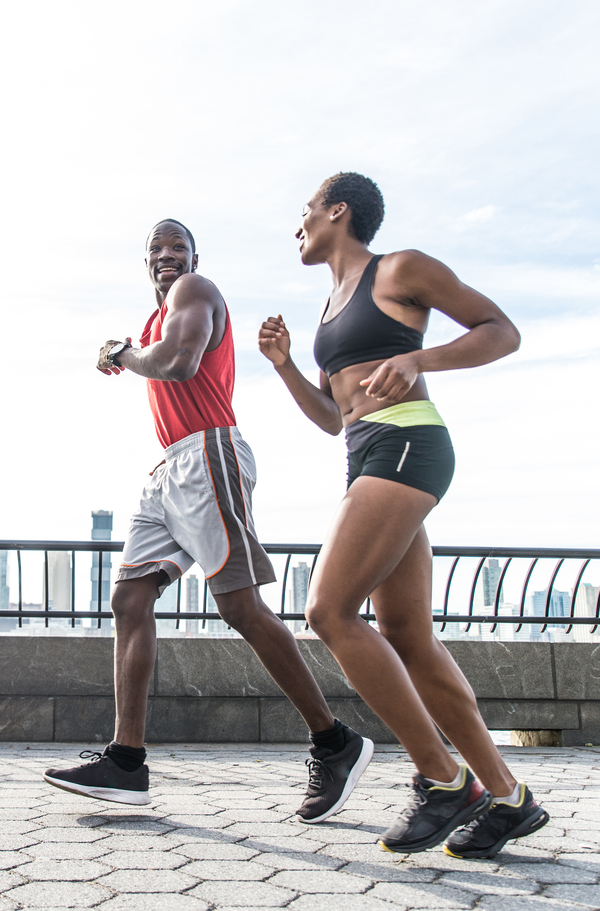We study the results of research
We figured out in detail how running is useful, and what this sport gives us – according to scientists. And not the notorious “British”, but quite real. So if you ever doubted whether it is worth trying to start this sport, here are the arguments from scientists.

We are less nervous and worried
Running and aerobic training are useful in managing stress as well as overcoming anxiety. Runners sleep better, and regular jogging is recommended for sleep disorders. While running, we are distracted from problems and habitual thoughts. How does it work?
The hormone cortisol, which is released during both stress and prolonged sport exercise, helps us run better by keeping our blood sugar stable. Therefore, after a hard nervous day, cortisol should be useful for its intended purpose and for the benefit of the body, that is, to run.
We feel happier
Overcoming kilometers every time gives the brain neurochemical “rewards” – endorphins. These are our internal drugs that bring happiness and pain relief. About the euphoria of a runner – “runner’s high” – we have already written.
Both the movement itself and the achievement of training goals give the brain a useful mediator of pleasure and reward – dopamine. It is the desire for dopamine reinforcement that drives us to go for a run over and over again.
Running and doing sports release serotonin, which makes us energized and happy. With a lack of serotonin, clinical depression, loss of strength and mood in premenstrual syndrome are associated. Depression can’t always be overcome by training alone, but runners are more likely to run away from it.
Training and participation in sport competitions is going beyond our own limits, allowing us to feel our strengths and capabilities. Therefore, runners and other athletes tend to have high self-esteem and a positive attitude towards their bodies, which is useful for mental health.
We age slower
Nobody wants not only dementia, but even wrinkles. Yes, the aging process is ongoing, but its speed can be different. Doing this sport is useful in
slowing down aging at the molecular level.

With help of sport, our body can build muscle, force cells to divide, but at the same time there is a risk of developing cancer, chronic inflammation, or simply shortening the telomere chromosomes. These are the end sections of chromosomes, and the longer they are, the longer we live.
We are getting healthier
According to a Mayo Clinic review, running is useful in preventing hypertension, fat metabolism disorders, type 2 diabetes, prostatitis, respiratory disease, and even cancer.
It is good for training the heart and reduces the risk of heart attack. With regular sport loads, we adapt to them, and the so-called cardiovascular adaptation (cardiovascular fitness) improves. If there is no sport, then the risk of cardiovascular disease increases.
Training is also useful for blood vessels. Overcoming at least 11-23 km per week significantly reduces the level of lipoproteins of low and very low density. They are carriers of cholesterol and fatty acids in the blood. When there are too many of them, then atherosclerosis – vascular disease – increases the chances. We wrote about this in detail in an article about running and cholesterol.
Runners are more likely to keep their eyesight. This is due to the already mentioned neurotrophin, which are useful not only to the brain, but also the retina. After all, the retina is also formed by neurons that need neurotrophin.
A 21-year sport study found that runners were less likely to become mobility impaired and dependent on outside help. It was also found that women who do sport or moved actively suffered less bone and muscle pain with age than those who were in the control “lazy” group. It is also very useful for your spine.
The joints of the legs during running training are subjected to significant stress. But if you train smart, choose the right shoes and pay attention to technique, it is useful for joints, especially those with osteoarthritis. This is a chronic disease in which the joints become inflamed and destroyed.
The load on the joints acts on the immune system, stopping inflammation. Losing weight, normalizing the ANS and heart rate, and optimizing your diet for exercise all help relieve osteoarthritis.
Running helps to normalize weight and prevents the development of a hereditary form of obesity. It is difficult to lose weight from just running, but regular sport training changes your lifestyle, makes you eat right and stick to the regime. All this, together with a decrease in anxiety, the launch of longevity cascades, and the tuning of the nervous system, helps to lose weight and maintain a normal weight.
We think more clearly, even with age
Research shows that running and aerobic training promote the survival of nerve cells in the brain. Thanks to the rhythmic movement of the legs, neurotrophin is released in the brain – a substance that is useful for
protecting neurons and prevents them from dying. Running improves cerebral circulation, reduces oxidative stress and slows down brain aging.
In Parkinson’s disease, for example, the neurons that release dopamine die. This causes movement problems. Neurotrophins and neurotransmitters, which are formed during running and sport exercise, are useful to the survival of nerve cells, and to some extent prevent the disease or its progress.
Our neurons are constantly networking. In the language of science, this is called neuroplasticity: new connections are formed, thanks to which we learn movements or remember. And running is very much useful for this.
Runners have better connections between brain regions involved in planning, decision making, memory and multitasking. And the more we run, the stronger this effect is. These same areas degrade with age, especially in Alzheimer’s disease.
Why should you choose running?
When running, all the main muscle groups of the body work and a large amount of energy is consumed, which leads to weight loss, muscle strengthening and a beautiful figure. But the effect of harmony is more of a side effect than the main one. Running is very good training for health, and this is its main purpose. Running strengthens the cardiovascular and respiratory systems, which is the prevention of heart and lung diseases.
